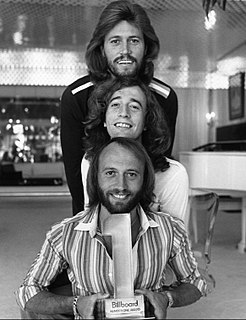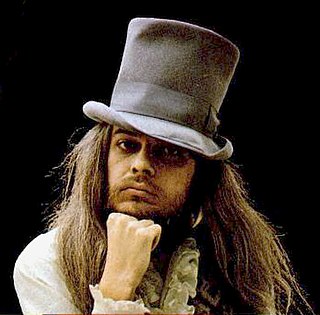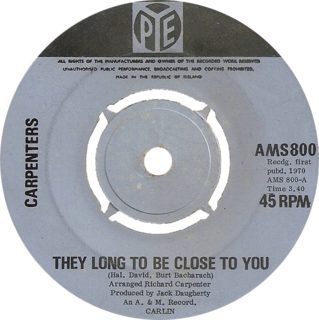1970 was a year of the Gregorian calendar.
1970 may also refer to:
- "19 70" (Boris song)
- "1970" (The Stooges song), also known as "I Feel Alright", from the album Fun House
- MCMLXX (album) an album by Ray Bryant
1970 was a year of the Gregorian calendar.
1970 may also refer to:
Heavy metal may refer to:
New Wave may refer to:

The Bee Gees were a music group formed in 1958, featuring brothers Barry, Robin and Maurice Gibb. The trio were especially successful as a popular music act in the late 1960s and early 1970s, and later as prominent performers of the disco music era in the mid- to late 1970s. The group sang recognisable three-part tight harmonies; Robin's clear vibrato lead vocals were a hallmark of their earlier hits, while Barry's R&B falsetto became their signature sound during the mid- to late 1970s and 1980s. The Bee Gees wrote all of their own hits, as well as writing and producing several major hits for other artists and have been regarded as one of the most important and influential acts in pop music history. They have been referred to in the media as The Disco Kings, Britain's First Family of Harmony, and The Kings of Dance Music.

Maurice Ernest Gibb was a British musician, singer, songwriter and record producer who achieved fame as a member of the Bee Gees. Although his elder brother Barry Gibb and fraternal twin brother Robin Gibb were the group's main lead singers, most of their albums included at least one or two songs featuring Maurice's lead vocals, including "Lay It on Me", "Country Woman" and "On Time". The Bee Gees were one of the most successful pop-rock groups of all time.

The Cars were an American rock band formed in Boston in 1976. Emerging from the new wave scene in the late 1970s, it consisted of Elliot Easton, Greg Hawkes (keyboards), Ric Ocasek, Benjamin Orr, and David Robinson (drums). Ocasek and Orr shared lead vocals, and Ocasek was the band's principal songwriter.
Catch-22 is a 1961 post-modernist satirical novel by Joseph Heller.

"Me and Bobby McGee" is a song written by American singer-songwriter Kris Kristofferson and originally performed by Roger Miller. Fred Foster shares the writing credit, as Kristofferson wrote the song based on a suggestion from Foster. A posthumously released version by Janis Joplin topped the U.S. singles chart in 1971, making the song the second posthumously released No. 1 single in U.S. chart history after "(Sittin' On) The Dock of the Bay" by Otis Redding. Gordon Lightfoot and Jerry Lee Lewis also released versions reaching number 1 on the country charts in 1970 and 1971 respectively. Billboard ranked Joplin's version as the No. 11 song for 1971.

Leon Russell was an American musician and songwriter who was involved with numerous bestselling records during his 60-year career that spanned multiple genres, including rock and roll, country, gospel, bluegrass, rhythm and blues, southern rock, blues rock, folk, surf and Tulsa Sound.

Diana Ross Presents The Jackson 5 is the debut studio album from Gary, Indiana-based soul family band the Jackson 5, released on the Motown label on December 12, 1969. The Jackson 5's lead singer, a preteenage boy named Michael, and his four older brothers Jackie, Tito, Jermaine, and Marlon, became pop successes within months of this album's release. Diana Ross Presents the Jackson 5's only single, "I Want You Back", became a number-one hit on the US Billboard Hot 100 within weeks of the album's release. The album reached number 5 on the US Pop Albums chart, and spent nine weeks at No. 1 on the US R&B/Black Albums chart.

"I Want to Take You Higher" is a song by the soul/rock/funk band Sly and the Family Stone, the B-side to their Top 30 hit "Stand!". Unlike most of the other tracks on the Stand! album, "I Want to Take You Higher" is not a message song; instead, it is simply dedicated to music and the feeling one gets from music. Like nearly all of Sly & the Family Stone's songs, Sylvester "Sly Stone" Stewart was credited as the sole songwriter.
Supernatural typically refers to unexplained or non-natural forces and phenomena.
Tangerine is a group of orange-colored citrus fruit.

"(They Long to Be) Close to You" is a song written by Burt Bacharach and Hal David. The best-known version is that recorded by American duo the Carpenters for their second studio album Close to You (1970) and produced by Jack Daugherty. Released on May 14, 1970, the single topped both the US Billboard Hot 100 and Adult Contemporary charts. It also reached the top of the Canadian and Australian charts and peaked at number six on the charts of both the UK and Ireland. The record was certified gold by the Recording Industry Association of America (RIAA) in August 1970.
Let It Be most commonly refers to:
Something may refer to:
Other often refers to:

"La-La " is an R&B/soul song by American vocal group The Delfonics. Released on January 26, 1968, by Philly Groove Records, the song was written by Thom Bell and William Hart, and produced by Bell and Stan Watson.
22 may refer to:

"On a Clear Day " is a song written by Burton Lane (music) and Alan Jay Lerner (lyrics) for the 1965 musical On a Clear Day You Can See Forever. It was subsequently performed by American actress and vocalist Barbra Streisand in the 1970 film adaptation of the musical.